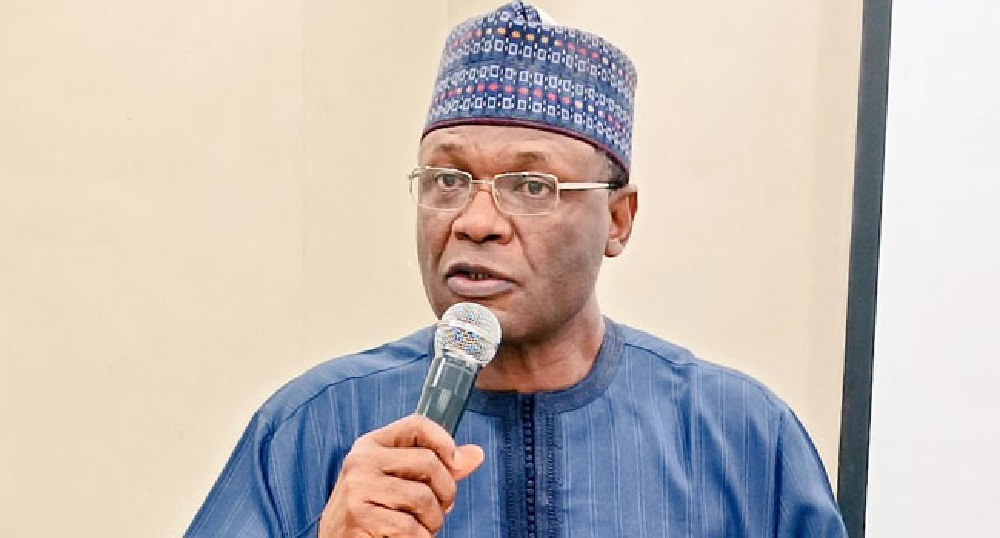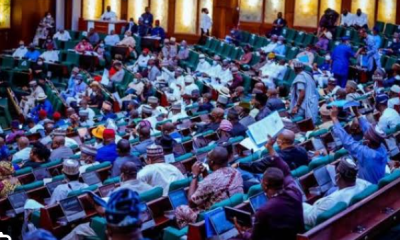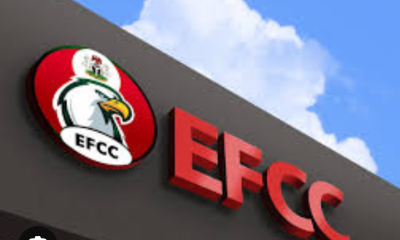News
Buying of delegates during primaries is a diabolical practice – INEC

The Independent National Electoral Commission (INEC) has advised Civil Society Organisations to shine a light on party primaries and pay special attention to the buying of delegates, calling it as a “diabolical practice.”
The panel stated that several delegates openly boasted about how much money they made from aspirants during party primaries.
Prof. Mahmood Yakubu, Chairman of INEC, made the observations during the first Regular Consultative Meeting with CSOs for the year 2025.
According to him, while civil society organisations have been actively watching general elections and voicing concerns about vote-buying at polling stations, there is now an urgent need to address the issue of delegate-buying during party primaries.
Yakubu stressed that the nomination process is an important step in the electoral process because only candidates who emerge from party primaries are on the ballot for residents to vote on Election Day.
He said; “I would like to urge civil society organisations to be as interested in party primaries as you are actively engaged in the monitoring of secondary elections conducted by INEC. After all, only the candidates nominated by the political parties are placed on the ballot paper for citizens to vote for on Election Day.
“From your monitoring reports as accredited election observers, you have consistently expressed concerns over vote-buying at Polling Units during elections. Some of you have made actionable recommendations on how to curtail the menace which have been favourably considered by the Commission. It is time to cast your net wide by focusing on the incidence of delegate-buying by aspirants during primaries.
“Some delegates openly boasted of how much money they made from aspirants during party primaries. You should intensify your advocacy in support of the practical steps taken by the relevant security and law enforcement agencies to tackle this diabolical practice”.
The INEC Chairman informed the CSOs that the commission announced the Timetable and Schedule of Activities for the Anambra State Governorship election on October 17th, last year.
“As required by law, the Notice of Election was published on 13th November 2024 i.e. 360 days before the date fixed for the election scheduled to hold on 8th November 2025. The next activity is the conduct of party primaries which begins next month. All political parties interested in fielding candidates for the election shall commence their primaries on 20th March 2025 and end three weeks later on 10th April 2025. The commission’s preparation for the election is on the agenda for this meeting.
“Similarly, the Commission has released the Timetable and Schedule of Activities for the Area Council election in the Federal Capital Territory FCT which is the only part of the country where INEC conducts Local Government election. The election will hold on Saturday 21st February 2026. As you are aware, the four-year tenure of the six Chairmen and 62 Councillors will end next year. The last Area Council election was held on 12 February 2022”, he added.
Ezenwa Nwagwu, Convener of Partners for Electoral Reforms, acknowledged the INEC Chairman’s views and pledged the CSOs’ commitment to combating vote-buying in both general elections and primaries.
“The challenge that you have thrown to us is a challenge that we will have to approach from a multi-stakeholder perspective. The menace of vote-buying at the general elections and that perpetrated by the politicians will need the collective effort of not just civil society, but also security agencies and the media. We will continue to shine a light on the activities of politicians, their parties, and candidates”, Nwagwu stated.
He also urged INEC to maintain and perhaps exceed the level of preparedness displayed in the Ondo State Governorship election to ensure a credible and transparent electoral process in Anambra State and beyond.
News
Senate mulls terrorism charges for oil theft offenders

The Senate, yesterday, issued a stern warning that perpetrators of oil theft in the Niger Delta region may soon face terrorism charges and other stiffer penalties.
Senate President, Godswill Akpabio, disclosed this while declaring open a two-day public hearing on the “Incessant and nefarious acts of crude oil thefts in the Niger Delta and the actors held.”
The hearing organised by the Senate Ad-hoc Committee on Incessant Crude Oil Theft chaired by Ned Nwoko is aimed at addressing the persistent theft of crude oil in the Niger Delta and produce actionable solutions to the problem.
Akpabio, who was represented by his deputy, Barau Jibrin, said the 10th National Assembly would not stand idly by as the country loses billions of dollars annually to what he described as “brazen economic sabotage.”
He disclosed that the National Assembly was considering a range of strong legislative responses, including categorising major acts of oil theft as terrorism, mandatory digital metering for all oil production and exports, real-time monitoring, improved transparency in crude lifting and revenue reporting, as well as enhanced coordination among military, law enforcement, and anti-corruption agencies.
“Crude oil theft is not a victimless crime. It is directly responsible for economic instability, a weakened naira, underfunded critical sectors, and widespread poverty in oil-producing communities. It also finances illegal arms, fuels violence, and strengthens criminal networks.”
Akpabio lamented that despite past efforts, crude oil theft continues unabated due to systemic failures and gaps in enforcement and oversight. Recent reports estimate that Nigeria loses between 150,000 and 400,000 barrels of crude oil daily, costing the country billions in lost revenue.
“This public hearing must address critical questions: Who are the perpetrators? Are they militants, corrupt officials, international collaborators—or all three? Why have current security measures failed? And how are stolen shipments leaving the country undetected?” he asked.
The Senate President called on all stakeholders including regulatory agencies, oil companies, security forces and host communities, to work collaboratively to stop the looting of the country’s most valuable resource. He emphasised that oil companies must invest in surveillance technology and secure infrastructure, while host communities should act as first-line defenders rather than victims or accomplices.
“To the criminals stealing our crude oil, your time is up. To the agencies tasked with protecting our resources, the nation is watching. And to this Ad-hoc Committee, the Senate expects a robust, no-holds-barred report that will guide firm legislative and executive action.”
Akpabio commended Nwoko, who chairs the Committee convening the hearing and stressed that the recommendations must lead to actionable, measurable and time-bound solutions.”
“The survival of Nigeria’s economy depends on how we respond to this crisis,” he concluded.
Meanwhile, ahead of its planned two-day national security summit, the Senate, yesterday, set up a 20-member committee to organise the event.
The Senate President, Akpabio, who announced the committee’s formation during plenary, said it would be chaired by the Senate Leader, Opeyemi Bamidele, with Yahaya Abdullahi serving as the vice chairman.
Other members are Ireti Kingibe (FCT), Adebule Idiat (Lagos), Barinada Mpigi (Rivers), Babangida Hussaini (Jigawa), Jimoh Ibrahim (Ondo), Osita Ngwu (Enugu), Tahir Monguno (Borno), Titus Zam (Benue), Ahmed Lawan (Yobe), Abdulaziz Yar’Adua (Katsina), Gbenga Daniel (Ogun), Austin Akobundu (Abia), Shehu Buba (Bauchi), Ahmed Madori (Jigawa), Emmanuel Udende (Benue), Adams Oshiomhole (Edo), Shuaib Salisu (Ogun), Isah Jibrin (Kogi) and the Clerk of the Senate, Andrew Nwoba.
The committee is tasked with developing the summit’s framework, including setting the agenda, identifying core issues for discussion, and recommending actionable strategies to improve national security. Akpabio directed the committee to submit its report within two weeks.
The decision to convene the summit followed a resolution passed on May 6 after a motion sponsored by Jimoh Ibrahim to address escalating security challenges in the country was adopted. It is expected to address pressing issues such as terrorism, insurgency, and the alarming trend of leaking military intelligence to militant groups, an issue widely seen as compromising ongoing security operations.
This is not the first time the National Assembly would attempt to address security concerns through a summit. In May 2021, the ninth Assembly, under the then Senate President, Ahmad Lawan and House Speaker, Femi Gbajabiamila, organised a similar summit. Despite contributions from security experts, civil societies, and government agencies, insecurity has continued to plague the country.
News
Court convicts 10 Thai sailors, vessel for cocaine trafficking

Justice Daniel Osiagor of the Federal High Court in Lagos on Thursday convicted ten Thai nationals for trafficking 32.9 kilograms of cocaine into Nigeria.
The convicted individuals, all sailors, were found guilty alongside their vessel, MV Chayanee Naree, which was used to smuggle the illicit drug into the country.
The convicted Thais’ sailors are: Krilerk Tanakhan; Boonlert Hansoongnern; Jakkarin Booncharoen; Thammarong Put-tlek; Worrapat Paopinta; Marut Kantaprom; Werapat Somboonying; Urkit Amsri; Panudet Jaisuk, and Amrat Thawom.
The vessel and convicted sailors were first arraigned before the court alongside nine Nigerians, on the alleged offences in February 2022, by the National Drug Law Enforcement Agency (NDLEA).
The Nigerians are: Samuel Messiah; Ishaya Maisamari; Ilesanmi Ayo Abbey; Osabeye Stephen; Gbenga Ogunfadeke; Kayode Buletiri; Rilwan Omotosho Liasu; Saidi Sule Alani, and Jamiu Adewale Yusuf.
The vessel, the convicted sailors and the nine Nigerians were arrested on October 13, 2021, at Apapa, Lagos, on their arrival from Brazil.
They were charged before the court on charges bordering on conspiracy, unlawful transportation and unlawful importation of 32.9 kilograms of Cocaine.
Their illegal acts, according to the NDLEA, contravened sections 11 (b), 11(a) and 14 (b) of the National Drug Law Enforcement Agency Act Cap N30 Laws of the Federation of Nigeria, 2004. And punishable under the same Act.
The convicted Thais and their Nigerian alleged co-conspirators were accused of committing the acts alongside the trio of Kehinde Enoch, Ayo Joseph and one Tunde, all said to be at large.
The convicted sailors were prosecuted by the NDLEA prosecutors, who include; Mrs Theresa Asuquo, A. Adebayo and Paul Awogbuyi. While they were defended by their team of lawyers, who include Babajide Koku, Femi atoyebi and Tunde Adejuyigbe, who are Senior Advocates of Nigeria (SAN).
Upon conclusion of the NDLEA’s case, the convicted sailors opted for No-Case-Submission instead of opening their defence against the allegations against them. This was, however, contended by the prosecutors, who submitted that they had established a prima facie case against the vessel and its Crew.
In deciding the No-Case-Submission, Justice Osiagor acceded to the submissions of the prosecution and held that the prosecution had established a prima facie case against the vessel and its Crew members.
The judge therefore ordered the convicted Thais and others to open their defence against the charges against them.
Based on the court’s ruling, the convicted sailors entered a plea bargain agreement with the NDLEA.
At the resumed hearing of the matter for judgment today, and based on the plea bargain agreement, Justice Osiagor ordered the vessel to pay a fine of $4 million USD or Naira equivalent.
On the convicted sailors, the judge ordered the three Captains of the vessel, namely; Krilerk Tanakhan; Boonlert Hansoongnern; Jakkarin Booncharoen; to pay the sum of $50, 000, 00 USD. And that the other crew member to pay $30, 000, USD each. And that other convicted sailors are ordered to pay the sum of N100,000. 00, as a fine optio n.
Meanwhile, the trial of the nine Nigerians has been adjourned to June 25.
News
Court of Appeal affirms nullification of Ebonyi council polls

The Court of Appeal Enugu Division has affirmed the judgement of Justice R O Riman of the Federal High Court Abakaliki, nullifying the conduct of Local Government election in Ebonyi State.
Justice Joseph Ekanem, who read the lead judgement of the Appeal court, gave the ruling while dismissing the three appeals filed by Ebonyi State Government, Central Bank and Local Government Chairmen, challenging the ruling of the Federal High Court.
The Appeal Court ruled that the earlier judgement of Justice R O Riman then of Federal High Court Abakaliki remains valid and subsisting.
According to the Appeal court: “The judgment in FHC/AI/CS/224/2022, which the Appellants challenged on appeal, was meant to enforce compliance with the earlier judgment in FHC/AI/CS/151/2022 contrary to the argument of the appellants.”
The court ruled that the appeals were dismissed for proliferation of issues for determination by the appellants which resulted in an incompetent brief of argument.
-

 Opinion24 hours ago
Opinion24 hours agoHuman Capital Devt: The Rep Paul Nnamchi
-

 News18 hours ago
News18 hours agoAlleged cyber bullying: IGP re-arraigns VDM
-

 News20 hours ago
News20 hours agoBREAKING: PDP, NNPP Rep members abandon parties, lace boots with APC
-

 News24 hours ago
News24 hours agoSEE Current Black Market Dollar (USD) To Naira (NGN) Exchange Rate
-

 News24 hours ago
News24 hours agoNnamdi Kanu’s family wants court to ban NAN coverage of son’s trial or allow live streaming
-

 News17 hours ago
News17 hours agoBill To Make Voting Compulsory For Nigerians Passes Second Reading
-

 News24 hours ago
News24 hours agoPDP Summons Emergency Meeting As South-East Threatens Exodus
-

 News23 hours ago
News23 hours agoAlleged scam: Coalition wants EFCC to charge ex-Chairman, Bawa to court immediately


















